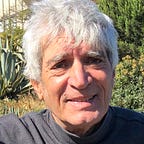When the King Is Sick
In the wake of the polarized, political turmoil of the Iraqi war, James Hillman published an article in Parabola entitled “The Gods, Disease, and Politics.”
In it Hillman writes: “The recognition of the intimate and subtly differentiated connection between myth and pain, between the gods and diseases and politics, is the greatest of all achievements of the Greek mind: the perfection of tragedy…”
“In the Greek sense,” he tells us, “we are today in just such a tragedy as Thebes under Oedipus Tyrannus: the king is sick. And in the madness of his sickness, in his profound unconsciousness, the tragedy of the nation lies — its poverty, wasted youth, the degeneration of its crops and soil, its water and forests … And all this because the king is blind to his own nature.”
And the above — published in America in 2004, with George W. Bush in mind — could have as easily been written today with Trump and our threatened ecosystems and wasted lives from the coronavirus in mind — or in Nazi Germany in the early 1940s. For each cultural era was deeply tinged, if not defined by the unconscious actions of a sick king blind to his own nature.
*
About midway in the essay, Hillman bends back (a favored move) and re-visions the very psychological method he pursues, in following the footsteps of C.G. Jung and Joseph Campbell. He calls attention to the fact that it gives “scant attention” to the historical timeframe of the myths themselves, the geographic locations from which the myths arose, or the authenticity of their transmission.
Instead, archetypal psychology attempts to uncover the presence of ancient myths in our own behavior and in what passes as an ostensibly un-mythic, consensual reality. In the process, those who likewise pursue this methodology “ravage the scholarship of others and pilfer whatever we can, justifying these violations in the name of bringing deeper understanding to psychological afflictions.”
For Jung and Campbell and those who work in this tradition attempt to show how Western antiquity can be relevant to modern psyches, and how our contemporary psyches can vivify Western antiquity (as the archetypes, on either hand, are as alive today as ever). For otherwise, “when scholars speak only to documents and psychologists only to patients, culture languishes, its soul shallow and unrooted in historical knowledge, and its knowledge without soul.”
And then, I would add, not only may we be suffering from a sick king, but a sick culture, one suffering from a tragic developmental arrest; one failing to develop a wider sense of inclusivity, a wider capacity for empathy. And such a culture lacking in historical knowledge, and dissociated from myth, is more apt to produce a sick king. For, as Aristotle suggests, hubris is perpetuated by those lacking a knowledge of history.
As remedy, we might think to kill the king, or exile him, a remedy humans have employed since antiquity. Those of us in the helping professions often witness a similar, inadequate, and confused sense of remedy in our patients, our clients, our brothers and sisters, or however we think of them.
Their own executive functioning, their own inner king — their own notion of what would cure them — is often part of the problem. For this reason, it’s often helpful to ask them what they think would rectify the problem. It will show you what hasn’t worked. For they’ve been looking under the wrong street light for where their own keys have been lost. And if they’d discovered a key or true cure for what ails them, they wouldn’t be showing up for therapy in the first place.
Today, we could indict, replace, or attempt to incarcerate the sick king, laying all our woes at the king’s door. Or we could hope to revive the sick king, supporting him to the end — while blaming the prevailing sickness all around us on those who have opposed him. While we, the people, could remain as shallow, our knowledge as lacking of soul, as blind to our own nature as the king.
We’ve had the warfare of a tribal psychology — whether civil, hot, cold, or proxy — for millennia; revolutions and elections for centuries. And have yet to fight, elect, or argue our way to wisdom. We’re so far from anything even vaguely in that direction, that I find myself binge-watching The West Wing for the third time in the last four years, just for a dramatic portrayal of something less appalling when I turn on my television.
Normally, political change in a culture happens in excruciatingly slow increments before the change becomes psychologically internalized. The American Civil War ended 155 years ago. Yet we are still divided over the power of the federal government to control or lead the states, and still suffering from racial inequality. And normally, individual development also doesn’t leap frog overnight. But these are not normal times. And that could change the calculus — or not.
Today, tomorrow, or in the months and years after the 2020 election results, whether we’ve replaced the sick king and his equally ill court or not, we could remain no wiser than before. So, isn’t it time to begin thinking: what are we going to do about that?
